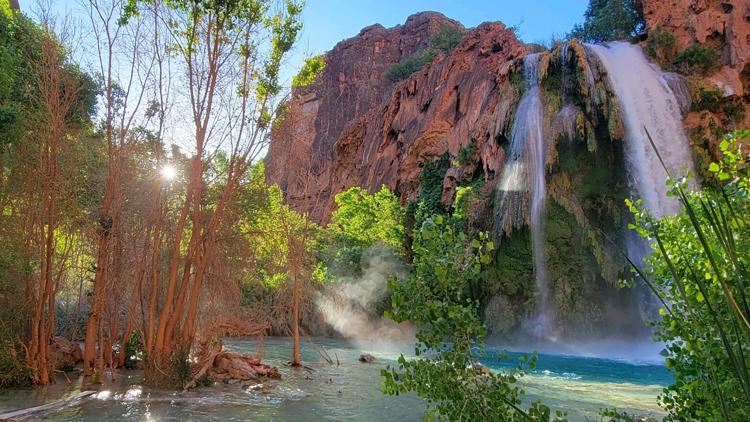ARIZONA, USA — Dozens of hikers say they fell ill during trips to a popular Arizona tourist destination that features towering blue-green waterfalls deep in a gorge neighboring Grand Canyon National Park.
Madelyn Melchiors, a 32-year-old veterinarian from Kingman, Arizona, said she was vomiting severely Monday evening and had a fever that endured for days after camping on the Havasupai reservation.
She eventually hiked out to her car in a weakened state through stiflingly hot weather and was thankful that her pack could be transported up a winding trail several miles by mule, she said.
“I said, ‘If someone can just pack out my 30-pound pack, I think I can just limp along,’” said Melchiors, an experienced and regular backpacker. Afterward, “I slept 16 hours and drank a bunch of electrolytes. I’m still not normal, but I will be OK. I’m grateful for that.”
The federal Indian Health Service said Thursday that a clinic it oversees on the reservation is providing timely medical attention to people who became ill. Environmental health officers with the regional IHS office were sent to Havasupai to investigate the source of the outbreak and to implement measures to keep it from spreading, the agency said.
“Our priority is the health and well-being of the Havasupai residents and visitors, and we are working closely with local health authorities and other partners to manage this situation effectively,” the agency said in a statement.
The Havasupai Tribal Council released the following statement:
"The Havasupai Tribal Council is working with local and state health authorities and other partners to manage this situation effectively. The Phoenix Area Indian Health Service (PAIHS) has mobilized to investigate and address reports of gastrointestinal illness affecting tourists camping at the Havasupai campground. PAIHS Environmental Health Officers were deployed on June 13, 2024 to investigate the source of the illness and to implement measures to prevent further spread. Preventative measures and public health advisories are being communicated to tourists and local tribal members"
While camping, Melchiors said she drank from a spring that is tested and listed as potable, as well as other sources using a gravity-fed filter that screens out bacteria and protozoa – but not viruses.
“I did a pretty good job using hand sanitizer” after going to the bathroom, she said. “It’s not like you can use soap or water easily.”
Coconino County health officials said Tuesday they received a report from a group of people who hiked to the waterfalls of “gastrointestinal illness” but didn't know how many people have been affected. The tribe's land is outside the county's jurisdiction.
Still, county health spokesperson Trish Lees said hikers should take extra precautions to prevent the spread of illness, including filtering water.
“Watch for early symptoms of norovirus, such as stomach pain and nausea, before the trip. Norovirus spreads easily on camping trips, especially when clean water supplies can be limited and hand washing facilities may be non-existent. Isolate people who are sick from other campers,” the county said.
Thousands of tourists travel to the Havasupai reservation each year to camp near a series of picturesque waterfalls. The reservation is remote and accessible only by foot, helicopter, or by riding a horse or mule.
The hike takes tourists 8 miles (13 kilometers) down a winding trail through desert landscape before they reach the first waterfall. Then comes the village of Supai, where 600 tribal members live year-round. Another 2 miles (3 kilometers) down the trail are camp sites with waterfalls on both ends.
Tourism is a primary source of revenue for the Havasupai Tribe. The campground that has a creek running through it has limited infrastructure. The hundreds of daily overnight campers can use composting toilets on site and are asked to pack out refuse. Recent accounts from hikers on social media indicate trails are littered with garbage, including bathroom tissue, plastic bottles and fuel canisters.
The Havasupai Tribe Tourism Office says it tested the water last week from a local spring that visitors rely on for drinking and found it was safe for human consumption.



